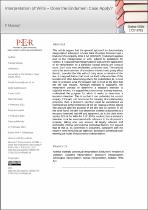| dc.contributor.author | Moosa, Fareed | |
| dc.date.accessioned | 2022-05-03T12:36:02Z | |
| dc.date.available | 2022-05-03T12:36:02Z | |
| dc.date.issued | 2021 | |
| dc.identifier.citation | Moosa, Fareed ‘Interpretation of wills – Does the Endumeni case apply?’ Potchefstroom Electronic Law Journal 24 (2021) pp. 1–30 | en_US |
| dc.identifier.issn | 1727-3781 | |
| dc.identifier.uri | https://doi.org/10.17159/1727-3781/2021/v24i0a8129 | |
| dc.identifier.uri | http://hdl.handle.net/10566/7342 | |
| dc.description.abstract | This article argues that the general approach to documentary interpretation articulated in Natal Joint Municipal Pension Fund v Endumeni Municipality 2012 4 SA 593 (SCA) (Endumeni) applies also to the interpretation of wills, subject to adaptation for context. It is argued that interpretation of wills and the application of an interpretation to a particular factual setting are coequal tasks. Each case must be decided on its own facts. The cardinal rule is the ascertainment of a testator's intention and giving effect thereto, provided that this will not bring about a violation of the law. It is argued that a court must put itself in the armchair of the testator and, after determining where the probabilities lie, it must infer or presume what the testator had in mind at the time that the will was created. Although intention is subjective, the interpretive process to determine a testator's intention is objective in form. | en_US |
| dc.language.iso | en | en_US |
| dc.publisher | Academy of Science of South Africa | en_US |
| dc.subject | Freedom of testation | en_US |
| dc.subject | Teleological interpretation | en_US |
| dc.subject | Wills Act | en_US |
| dc.subject | Textual interpretation | en_US |
| dc.subject | Endumeni | en_US |
| dc.title | Interpretation of wills – Does the Endumeni case apply? | en_US |
| dc.type | Article | en_US |

